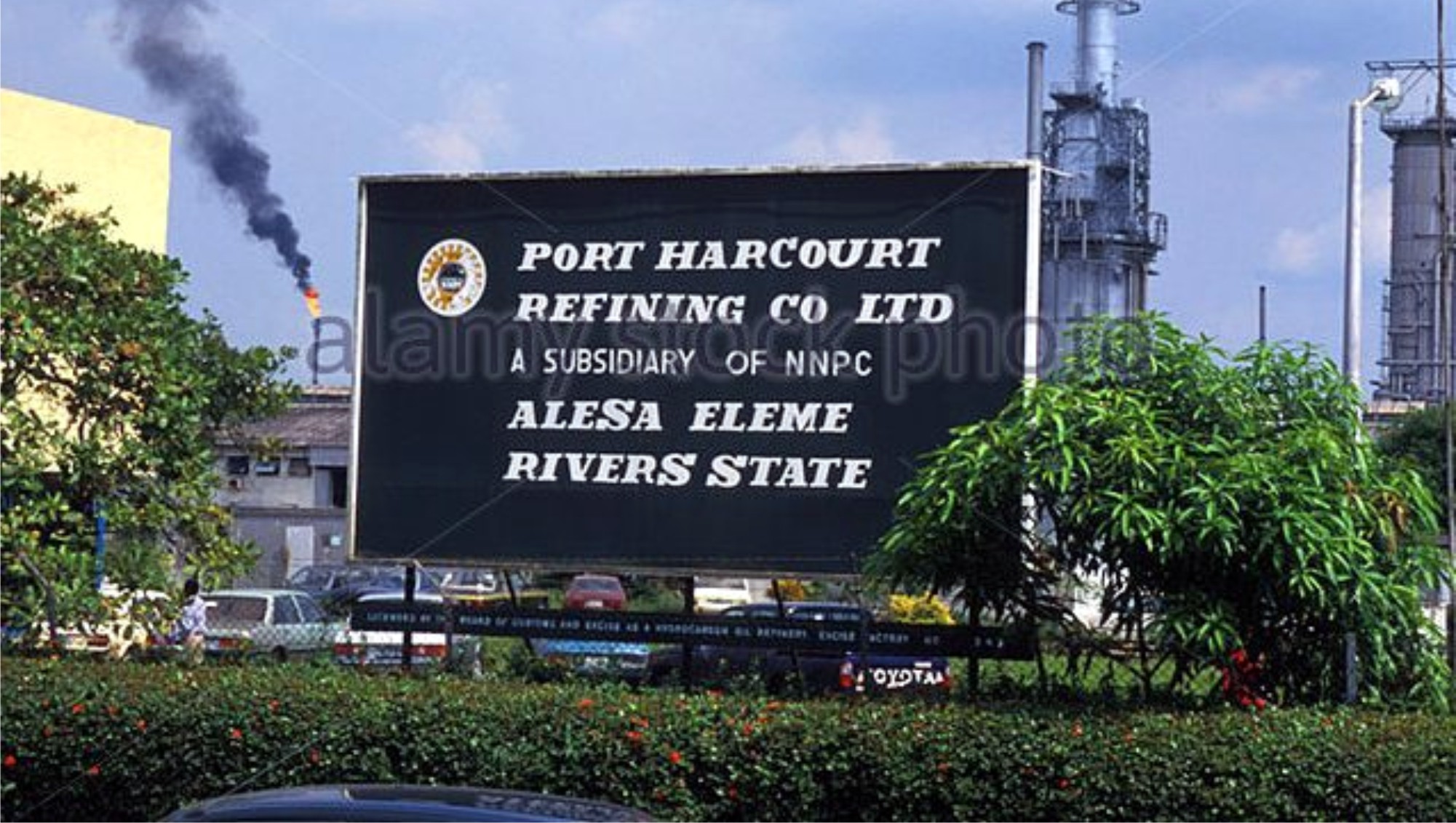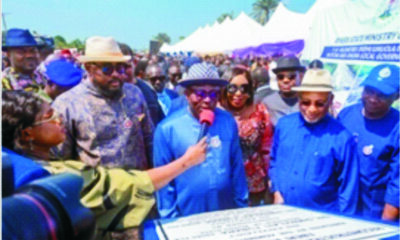Oil & Energy
PH Refinery Trains 80 Youths In Rivers

The Port Harcourt Refining Company Limited (PHRC)-Eleme has graduated 80 participants of its youth empowerment and skills acquisition programme, charging them to be economically preoccupied with their acquired skills.
The Managing Director, PHRC, Mr Abba Buka gave the charge at the 3rd Graduation Ceremony of Youth Empowerment and Skills acquisition Programme (YESAP) in Eleme, Rivers, recently.
The beneficiaries were trained in welding and fabrication, information and communication technology, agriculture vocation, catering, hair dressing, fashion and design and interlock/block moulding.
Starter packs which ranged from sewing machines, power generating sets, hair dryers and washers, welding inverters, gas cookers, to cooking pots were presented to them according to the skills they acquired.
Buka, who presented the beneficiaries with Certificates of Completion and starter packs, urged them not to sell the packs but to use them judiciously to be empowered economically.
According to him, skills acquisition and youth empowerment are no doubt a proven route to economic prosperity for any community.
‘’It affords the youth an opportunity to explore inner creative talents in them, build confidence and explore channels for useful economic involvement.
He said that it was due to the advantages that the company, in commitment to its corporate social responsibility and sustenance of its community relations, invested in the YESAP for the youth of its host communities (Eleme and Okrika).
‘’It is my hope and belief that the youth empowerment and skills acquisition programme will divert the attention of the youth from crimes and criminality as they would be economically preoccupied.
‘’And therefore reduce cases of strife and apprehension in the communities and youth restiveness,’’ the MD said.
Buka charged the host communities to continue on the part of peace and negotiation using the Joint Community Relations Committee (JCRC) platform to resolve any differences that might arise.
He assured the communities that they would be carried along in the different phases of the company’s planned rehabilitation, adding that the company was committed to maintaining the cordial relationship with the communities.
Also speaking Executive Director Services, PHRC, Mr Babatunde Sofowora said that the graduation of the 3rd edition of YESAP was a testament to the commitment of the company and NNPC to foster mutual and symbiotic relationship with the host communities.
The company had earlier trained 155 youths in various areas of trade in its first and second editions and the recent edition has brought the number of beneficiaries to 235.
Mr Obari Moses, who spoke on behalf of the beneficiaries, thanked the company for its gesture stating, ‘’we are well-trained. Acquisition of talent cannot be quantified.
‘’We are aware of the challenges in business but with the knowledge we have been given, we shall surmount the challenges.’’
Another beneficiary, Grace Obari who acquired skills in fashion and design said that she had achieved something she never achieved in her life adding, “now I can sew by myself.
“I’m very happy about the scheme; may the Lord bless the PHRC abundantly for giving me skill to better my life and contribute my own quota to the economy.”
Oil & Energy
Bill Prohibiting Gas Flaring Passes 2nd Reading

The Bill for an act to prohibit gas flaring, encourage commodity utilisation, and provide for penalties and remedies for gas flaring violations has passed its second reading in the House of Representatives.
Sponsored by the Member representing Ikorodu Federal Constituency (APC, Lagos), Babajimi Adegoke Benson, the bill seeks to prohibit the flaring and venting of natural gas, except in strictly regulated circumstances, while encouraging the utilisation of gas resources to foster economic growth and energy generation.
The proposed legislation aims to mitigate the environmental, health, and economic impacts of gas flaring, aligning Nigeria’s oil and gas operations with international climate change commitments.
Offenders, who violate the provisions of the proposed law, would face stringent penalties, including fines of $5 per 1,000 standard cubic feet of gas flared and potential suspension of operations for repeat violations.
Leading debate on the general principles of the bill, Benson said gas flaring has plagued Nigeria for decades, resulting to severe environmental degradation, public health crises, and economic losses while it environmentally, contributes to greenhouse gas emissions, global warming, and acid rain, exacerbating climate challenges.
The lawmaker said public health impacts of the practice are equally dire, as pollutants from gas flaring cause respiratory and cardiovascular diseases, particularly among residents of communities close to flaring sites.
According to him, economically, flaring results in the waste of a valuable resource that could otherwise be harnessed for energy generation or exported to generate revenue.
Benson insisted that the bill was designed to address those issues while bringing Nigeria in line with global standards such as the Paris Agreement on climate change.
“The bill provides for a comprehensive prohibition of gas flaring except in emergencies or when explicitly authorised by the Nigerian Upstream Petroleum Regulatory Commission (NUPRC).
“Operators are required to submit and implement Gas Utilisation Plans, detailing how gas that would otherwise be flared will be captured, processed, or commercialised.
“Offenders, who violate these provisions, face stringent penalties, including fines of $5 per 1,000 standard cubic feet of gas flared and potential suspension of operations for repeat violations. Furthermore, the Bill ensures that communities affected by gas flaring are entitled to compensation and environmental restoration, creating a mechanism for redress.
“Transparency and accountability are integral to the enforcement framework of this Bill. Operators must submit regular reports on gas flaring incidents, which will be audited and made publicly available by the NUPRC. This approach ensures public oversight and stakeholder engagement, fostering trust and compliance.
“Nigeria’s adoption of this Bill positions the country to emulate such success, ensuring a balance between environmental stewardship and economic development.
“The implementation of this Bill will be overseen by the Nigerian Upstream Petroleum Regulatory Commission, which will monitor compliance through regular audits, enforce penalties, and facilitate gas utilisation projects in collaboration with operators and development partners.
“The Anti-Gas Flaring (Prohibition and Enforcement) Bill, 2024, is a timely and necessary response to one of Nigeria’s most pressing environmental challenges. Its provisions are both practical and forward-looking, addressing immediate concerns while laying the groundwork for a sustainable future.
“I urge all Honourable Members to support the Second Reading of this Bill as a demonstration of our collective commitment to environmental protection, public health and economic progress”, he added.
###
Oil & Energy
‘Indigenous Companies To Gain From Shell’s Contract Awards’

Oil major, Shell, has restated its commitment to the development of Nigerian companies through contract awards and scaling up of expertise.
Managing Director, Shell Nigeria Exploration and Production Company ((SNEPCO) Limited, Ron Adams, made the remark while speaking at the Opening Ceremony of the 13th edition of the Practical Nigerian Content forum held in Yenagoa, Bayelsa State, with the theme “Deepening the Next Frontier for Nigerian Content Implementation”.
Represented by the Manager, Business Opportunity, SNEPCO’s Bonga South-West Aparo Project, Olaposi Fadahunsi, he said several benefitting companies had taken advantage of the patronage to expand their operations and improve their expertise and financial strength.
Adams said, “Shell companies execute a large proportion of their activities through contracts with third parties, and Nigeria-registered companies have been key beneficiaries of this policy aimed at powering Nigeria’s progress”.
He emphasized that Shell companies in Nigeria also continued to develop indigenous manpower through scholarship programmes with over 3,772 undergraduate and 109 Niger Delta post graduate scholarships since 2016.
“As we speak, beneficiaries of the 13th edition of the Niger Delta Post Graduate Scholarship awards are pursuing their studies in the United Kingdom. The employability rate of the scheme is high with over 98% of the graduates who won the awards securing employment in the oil and gas industry, academia and Information Technology, among other sectors, within one year of completing their studies”.
He commended the Nigeria Content Development and Monitoring Board (NCDMB) for ensuring compliance with the Nigerian Content Act saying “Nigerian content will continue to be an important part of Shell operations”.
The four-day conference hosted by the Nigerian Content Development and Monitoring Board (NCDMB) and participating companies reviewed progress on the development of Nigerian content pertaining to the implementation of the Nigerian Oil and Gas Industry Development (NOGICD) Act since it was enacted in 2010.
Shell companies in Nigeria are among the more than 700 oil and gas entities that participated in the forum with a strong message of support for Nigerian companies, having awarded contracts worth $1.98 billion to the businesses in 2023 in continuing effort to develop Nigerian content in the oil and gas industry.
Oil & Energy
NNPC Begins Export From PH Refinery

The Nigerian National Petroleum Company Limited (NNPCL) has sold the first cargo of Port-Harcourt low sulfur straight run fuel oil (LSSR) to Dubai-based Gulf Transport & Trading Limited (GTT).
The company is expected to load the cargo in the coming days onboard the Wonder Star MR1 ship, signalling the commencement of operations at the plant and the exportation of petroleum products.
The ship would load 15,000 metric tons of the product, which translates to about 13.6 million litres.
Although the volume coming from the NNPC into the global market is still small, the development has the potential to impact the Very Low Sulphur Fuel Oil (VLSFO) benchmarks in the future, while changing the market realities for Atlantic Basin exporters into Nigeria and other regions.
The sulfur content of the export by NNPC stands at 0.26 per cent per wt and a 0.918 g/ml density at 15°C, according to Kpler, a data and analysis company.
The cargo was reportedly sold at an $8.50/t discount to the NWE 0.5 per cent benchmark on a Free on Board (FOB) basis.
Kpler reported that the development would help displace imports from traditional suppliers in Africa and Europe, as Nigeria’s falling clean product (CPP) imports are already decreasing, dragging imports into the wider West Africa region lower as well.
-

 News3 days ago
News3 days agoNAFDAC Demands Full Compliance With Ban On Satchet, PET Bottle Alcohol
-

 Business3 days ago
Business3 days agoCustoms Marine Command Nabs Three Suspects
-

 Rivers3 days ago
Rivers3 days agoLawmaker Tasks Govt On Indigenous Cultures, Languages Promotion
-

 News3 days ago
News3 days agoFG Denies Appointing Ambassadors, Urges Nigerians To Disregard Fake List
-

 News3 days ago
News3 days agoOndo Election: INEC Blames Banking Errors As Ad-hoc Staff Demand Payments
-

 News3 days ago
News3 days agoAmidst Attempts To Starve Us Of Funds, We’re Still Providing Services, Projects -Fubara
-

 Business3 days ago
Business3 days agoFree Meter Distribution: FG Deducts N700bn From Federation Account
-

 Rivers3 days ago
Rivers3 days agoRSG Gives Illegal Dump Site Operators Quit Notice

